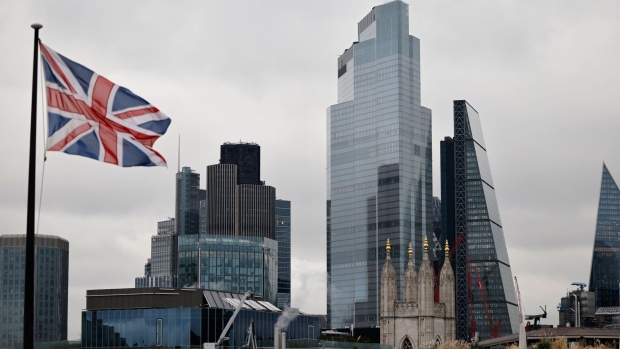Apr 11, 2024
UK Aims to Learn From Big Tech’s Battles With EU Regulators With Own Tailored Regime
, Bloomberg News

(Bloomberg) -- US tech giants are reeling from the European Union’s freshly minted Digital Markets Act — a landmark piece of legislation imposing a raft of dos and donts on how Silicon Valley firms ply their trade.
Twenty two miles across the English Channel, the UK is also poised to deliver its very own crackdown aimed at nipping antitrust abuses by the likes of Apple Inc., Amazon.com Inc., Microsoft Corp in the bud before they take hold. But in true Brexit fashion, the way Britain intends to do it is different from in the 27-nation bloc it left.
The UK’s Digital Markets, Competition and Consumers Bill is set to come into force after the summer. Unlike the EU’s one-size-fits all approach, it will give watchdogs the power to probe specific activities of individual companies designated as having “strategic market status.” They will also be able to apply a bespoke set of requirements for each case.
Coming after the DMA allows Britain’s Competition and Markets Authority to learn from developments in the EU, according to Tom Smith, the former legal director at the CMA and now partner at Geradin Partners.
“The CMA is sitting there taking notes,” he said. By studying non-compliant behavior in Europe, the CMA’s Digital Markets Unit can “write in rules to stop that.”
Companies drawn under this scope must have entrenched digital market power in the UK, a position of strategic significance, and a global revenue of more than £25 billion ($31.7 billion) or UK sales of more than £1 billion. The draft regulation imposes fines of up to 10% of a company’s global annual revenue.
Under the EU’s CMA, Apple has tweaked its compliance strategy in the bloc twice since March. The iPhone maker wouldn’t be able to do that if faced with tailor-made remedies, said Al Mangan, a partner at Addleshaw Goddard.
“Seeing Apple’s approach play out under the DMA will be useful for the CMA, making it harder for Apple to claim it was just working out how the code applied,” he said.
The UK bill, as proposed, gives far less scope to challenge the DMU’s decisions as companies can only appeal rulings if the DMU has made procedural errors. By contrast, the EU’s Digital Markets Act allows offending companies to challenge the assumptions and underlying evidence of the decision itself.
The EU’s approach has already drawn a number of Big Tech companies to the EU courts. Apple, Meta and ByteDance Ltd.-owned TikTok are all fighting their designations as “gatekeepers” under the rules. The UK, on the other hand, will be much less hamstrung it how in curtails Big Tech abuses.
“There are very few checks and balances on what the CMA can do,” says Verity Egerton-Doyle, a partner at Linklaters in London. “So you’re relying on the CMA to get it right.”
©2024 Bloomberg L.P.





